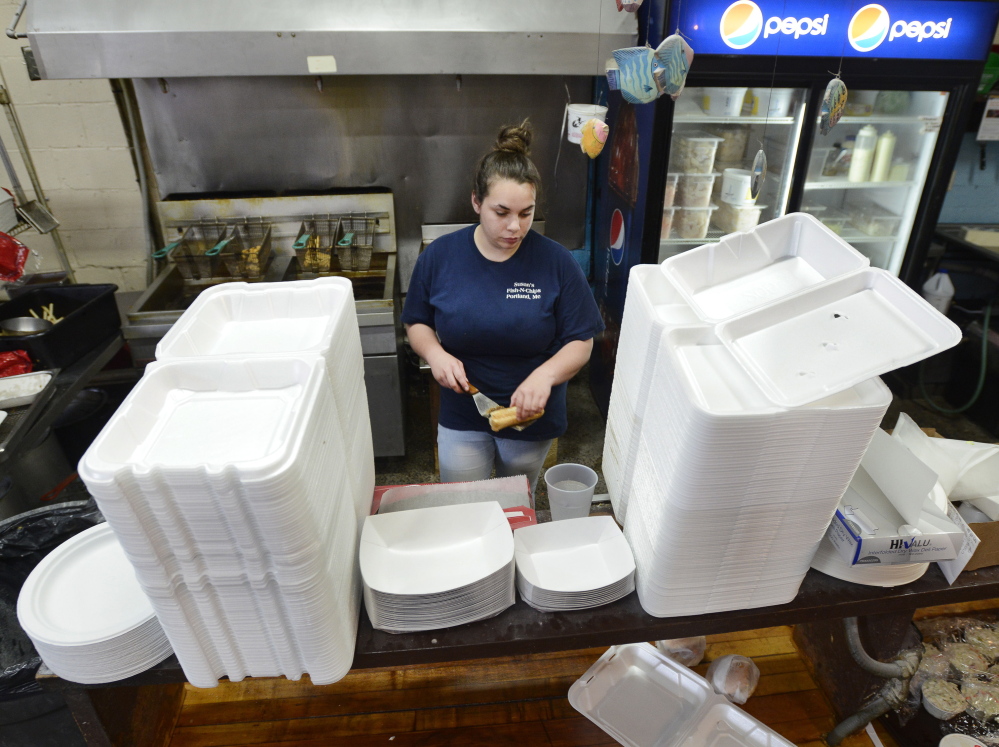Some business people in Portland are concerned that the city’s newly approved ban on foam food containers and cups and its fee for using disposable plastic or paper bags will cost consumers money.
But Steve Goodman sees a potential boon for his Auburn business, which he expects will supply many of Portland’s restaurants with biodegradable cups and containers when the measure takes effect next April.
Goodman, an owner of Goodman Wiper and Paper, said his restaurant customers’ preference for biodegradable containers has grown so much that about half now opt for the more environmentally friendly alternatives to polystyrene foam, despite the higher costs.
“They’re actually starting to get very popular because a lot of restaurants want to be green,” he said.
That green sheen comes at a price: Goodman said a box of 200 polystyrene meal containers costs about $20, while containers made primarily of wheat straw and a byproduct of sugar cane run about $65 for a box of 300 – more than double the cost of polystyrene.
Restaurants are likely to pass that higher cost to customers, although some owners say they may simply absorb it.
Marco DeSalle, who owns City Deli in One City Center, wraps most of his sandwiches in wax paper, but hot meals go into polystyrene containers. He said he may have to raise his meal prices by 50 to 75 cents to cover the higher cost of biodegradable containers next spring.
But DeSalle said he can balance the potential loss of some business against the intended benefits of the ordinance. “In the long run, I think it will help the environment and probably save money at the landfill,” he said.
Susan Eklund, who owns Susan’s Fish-N-Chips on Forest Avenue, said she won’t change her prices as she adapts to the new rules.
“We’re going to have to do it, there’s no sense in getting up in arms about it,” Eklund said, although she is concerned about the fate of her free coffee.
Her customers can have coffee on the house while they wait for their seafood, Eklund said, but that perk will get expensive if she has to pay twice as much as now for the small polystyrene cups she provides.
“I will probably encourage people to bring their own mugs,” she said, “but if that’s the biggest consideration I have, my free coffee, then life is pretty good.”
The Maine Grocers and Food Producers Association is still unhappy with the Portland City Council’s vote Monday to add a 5-cent fee on disposable paper and plastic bags, to give people an incentive to get reusable fabric bags for their groceries.
“We’re disappointed the city maintained its tax on the consumer,” said Shelley Doak, the association’s executive director, even though retailers will keep the money. “It’s an administrative nightmare for retailers.”
Doak said checkout clerks, who are used to scanning bar codes to record sales, may make mistakes when they enter the bag sales at 5 cents each, plus sales tax.
She also said that customers who use food stamps won’t be able to pay for bags with them, and that the ordinance could cause consumers to shop in neighboring communities to avoid the fees.
“Five cents doesn’t sound like a lot, but over time those fees add up, and taking this out of the pockets of people’s grocery bill is a bad policy,” she said.
Doak said city officials should have discussed other options, such as better enforcement of litter laws to keep plastic bags from getting into Casco Bay, where they can harm wildlife. But officials had already made up their minds to adopt a fee, she said, even before they formed a study group on the issue last year.
Regarding the ban on polystyrene, she said, “People who litter with a foam cup are just as likely to do so with a paper cup.”
In Washington, D.C., a follow-up study after the district adopted a 5-cent bag fee suggested that the surcharge deterred people from using plastic and paper bags.
Before the fee was imposed, city officials estimated that it would generate about $5 million a year. In fact, it has generated only about $2 million a year. Officials say that means people are getting fewer disposable bags.
In Washington, four cents of the fee goes to a river cleanup fund and one cent goes to the retailer.
Greg Dugal, executive director of the Maine Restaurant Association, said he worries that the ban on polystyrene may lead some retailers to add cardboard sleeves to their coffee cups because alternatives aren’t as good at holding heat.
“Polystyrene is a great product to keep cold food cold and hot food hot, so there’s a quality issue,” he said. “There’s no question there’s going to be more expenses.”
Doak and Dugal said they don’t anticipate any legal challenges to Portland’s ordinance, since bag bans or fees have withstood challenges in other states. According to the Surfrider Foundation, one of the national proponents of efforts to reduce bag use, 161 communities have bag fees or bans.
Doak and Dugal also said they don’t expect other communities in Maine to follow Portland’s lead.
“Portland wants to be a leader in a lot of areas and this is one of them,” Dugal said. “I really don’t see this as some sort of movement.”
Send questions/comments to the editors.




Success. Please wait for the page to reload. If the page does not reload within 5 seconds, please refresh the page.
Enter your email and password to access comments.
Hi, to comment on stories you must . This profile is in addition to your subscription and website login.
Already have a commenting profile? .
Invalid username/password.
Please check your email to confirm and complete your registration.
Only subscribers are eligible to post comments. Please subscribe or login first for digital access. Here’s why.
Use the form below to reset your password. When you've submitted your account email, we will send an email with a reset code.